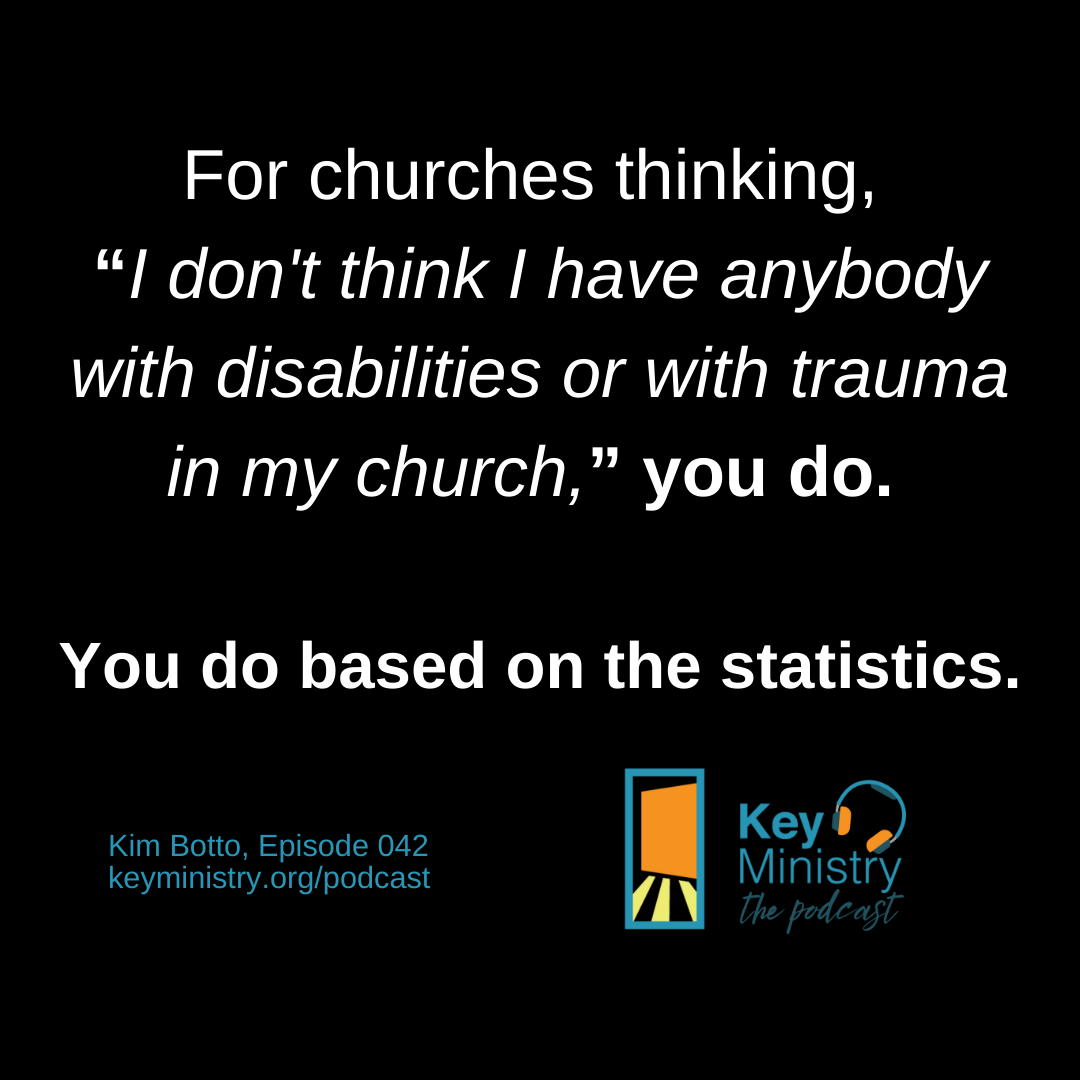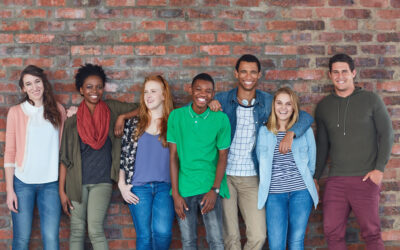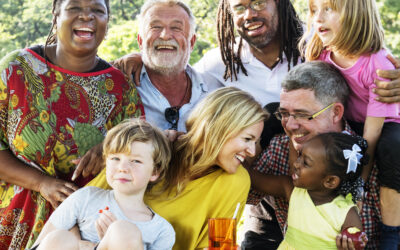In today’s podcast episode, Catherine Boyle talks with Kim Botto, one of the featured speakers at DATC2023.
Listen now in your favorite podcast app!
Quick Links:
Disabiilty and The Church 2023
If you liked this episode, you may also enjoy:
-
036: Acceptable and Accessible Churches with Chris Hulshof and Sandra Peoples
-
023: Supporting Special-Needs Families with Stephanie Hubach with Sandra Peoples
Transcript:
Boyle: Welcome to the Key Ministry podcast, and thanks so much for taking this opportunity to spend some time with me. I’m Catherine Boyle, one of the podcast hosts, and today I have the pleasure of introducing you to one of our featured speakers for Disabiilty and The Church 2023.
Boyle: Kim Botto is a lady who has done a lot of different things in ministry, and she is somebody that you should know. So welcome, Kim, to the Key Ministry podcast.
Botto: Thanks, Catherine. It’s good to be here.
Boyle: I’ve really appreciated learning a little bit about the work that you’ve done. You are a lady who has done many different things, both in church and in para-church kind of organizations. So just talk a little bit if you would, about yourself, your background, your family and what led you to disability ministry work?
Botto: Okay. Well, first of all, I’ll start with my family. I’m the mom of five. We have five kids, three bio and two adopted. And really that was part of getting me very interested in trauma, and the effects of trauma, particularly for kids.
Botto: And then we have 10 grandkids. So that’s super fun. My 5 year old grandson was diagnosed with autism a couple years ago. I was already very interested in disability ministry, but that has just made me even more passionate about it.
Boyle: Definitely. That’s a lot of little kiddos to keep you hopping! My goodness.
Botto: Lots of little kiddos. And then I’ve worked in ministry for decades through my last ministry position. It was at a large multi-site church with locations in Ohio and Kentucky, where I led kids and student ministry, as well as our initiatives around adoption and foster care.
Boyle: OK, great.
Botto: And then I’ve also worked—most recently—worked for a not-for-profit that worked with multi-system involved young people. So these are kids—all of them were in foster care or group homes; some have been more involved in other systems. We really worked to build relationships with them and help them reach their full potential.
Boyle: So you know, as somebody who’s been a ministry for a long time, [you’ve] seen first-hand some of the challenges that families face when we’re talking about disabilities and mental health issues and trauma.
Boyle: If you’re a ministry leader listening to this, what are a couple of things that you can think of that ministry leaders can do to make a meaningful difference in the lives of families or individuals who may have some of these challenges? Things that maybe they could do this year, [what can they] right now start thinking through; what it is that they can do to reach out to that that one family, or to their local community?
Botto: One [thing] you just said: reach out. That’s a great step rather than waiting for people to come to us. Friends, take the first step towards them. When we do take that first step, not wait, but approach them with curiosity. Rather than making assumptions on what they might need—because we really don’t know and what they might need and today might be totally different than what they need tomorrow.
Botto: So I say just start talking to different families, and find out how you can best support them. How you can come around to them, and also just how you could be a friend to them.
And they don’t want people that are just coming in and ‘supporting’ them. For a lot of families with kids with disabilities, they feel very alone and isolated. And just like you and me, Catherine, they want people to have coffee with. And they want people to go to the movies with, and it’s probably harder for them to do those things because they have a child where maybe it’s not as easy to get a babysitter to come in and care for them. So be curious and be a friend.
Boyle: Those are things that we all learned, about how important it is to have that human connection, just through the whole COVID experience.
Boyle: So if you’re a ministry leader, just think back about how challenging it was, to be isolated and use that personal experience—that you had to out to that family or that individual that you know in your community, who may be living with some of these issues. And those kinds of things don’t take staff and they don’t take money. They just take people who are paying attention, and maybe willing to invest some time to just be that [friend], to share in that Ministry of Presence, if you will, which is what friendship is all about.
Boyle: So again, you said you’ve been in disability ministry or ministry for decades, so most of us who you know, whatever role we find ourselves in, we could say, oh goodness, I wish I had known this at the beginning of the work I was doing. Are there a couple of things that you could share with the listeners that you wish you had known when you were starting out in ministry, that could be really helpful for somebody who’s just getting started now?
Botto: Well, if we’re looking particularly at Disability Ministry, I would say I wish I would have known what a difference simple efforts can make in the lives of families of kids with special needs and disabilities. I wish that I had known how isolated these parents feel they feel. I think that would have given me more [incentive] to get up and really work to provide spaces for them. I wish that I would have known that. We make it way more complicated than it needs to be.
Botto: But you know, I led at this really large multi-site church, and some of our sites had a room. We called it the inclusion room, or we called it the sensory room, where kids could come for a break. Some kids spent the whole time in there, some didn’t. We had other sites where they didn’t have a room.
Botto: You don’t need a room! You may need—you probably do need a quiet space, but that can be in the hall; that can be in a corner of the room, right? Also I think another thing I wish I would have known is I was trying to make all these preparations for kids. And really, rather than make preparations for kids that you don’t know—I’m talking about, like buying equipment and things—look at the kids you do have. Figure out what they need and meet the needs of the kids who are already there.
Boyle: Right. One thing that we also talk about is that nobody wants to be a project! So give people who—maybe live with challenges—[give them] opportunities for service as well; it just goes such a long way [giving service opportunities] because we all have gifts to give to the body of Christ.
Boyle: I really appreciate hearing that simple things are really places to start; the whole approach can be very simple. It’s more about changing your perspective to be able to see what the needs are, and then come alongside to meet the needs, and welcoming the individual or family into the greater body of Christ.
Botto: Yes, and I’ll also say trauma is a unique need. I work with a lot of families whose kids have experienced trauma. And that is a real opportunity for churches.
Botto: I think the biggest challenge and the biggest opportunity for churches today is—what do you do with the kids that you don’t know what to do with?
Botto: So often we look at behavior, and we look at it as a kid being non-compliant, or a kid…
Botto: I was talking to somebody the other day who said, ‘This four year old is manipulative.’ I’m like, well, I don’t think the four year old’s being manipulative! They have a need, they may be in survival mode.
Botto: So I think being aware that the unique needs that somebody has may not be apparent to us—but they are there [unique needs]. As we’re being curious, we can see through their behavior, right, that this child has needs that are being that are not being met.
Boyle: We often say that behavior is communication, and when you start to look at it that way, instead of, “Oh, this child is bad,” you know it’s really a person who needs some kind of support, to be able to thrive in the environment, whatever the cause is.
Botto: Right. When kids are actually—the kids aren’t bad. When we start—and I know you’re not saying that—but when—the way we respond to them…
Botto: Like Catherine, think of a kid. If you’re looking at a kid and you’re going “Oh, my gosh, they’re just not following the rules. They’re being bad. You’re going to respond to them in a much different way than if you’re looking at a kid and saying, “Oh, they’re having a really, really hard time now. Yes, they seem like they’re angry about something. You’ll be much more likely to help them.
Boyle: Yes, it’s a vast difference between a problem to be solved versus a person to be loved. And that’s exactly what you’re talking about there.
Boyle: So you are one of our featured speakers at Disability And The Church 2023, the last weekend of April in Cleveland, OH. For those who are listening right now, why do you think that people should come to Disability And The Church?
Botto: Well, I think back to what I said before: I think that one of the biggest challenges and biggest opportunities for us as a church community is ‘how do we include everybody?’ Whether it be kids that we’re not sure what to do with their behavior, or an adult that wants to serve, and we’re not sure how we get them involved in the church, because everybody has something to offer, and coming together with other people who maybe don’t have all the answers, but are passionate about it.
Botto: By attending, not only can you be encouraged, but you can be an encouragement to other people. It is such important work. I have seen the impact in churches when they do become an environment where everybody has a place, and they have community and they have friends; they have a place. They have places to serve. They have places to laugh and eat, drink coffee with people. It makes a huge difference, and I believe that’s what Heaven looks like.
Botto: You know, Heaven doesn’t have us all in different areas based on our abilities or intellect or energy level.
Boyle: That’s right.
Botto: And that’s why I’m excited about the conference, and that’s why I want more people to come. I want—the Church can do better. But in order for us to do better, we’re going to need some new tools, new strategies, and that’s what this conference is going to offer.
Botto: And for churches who are thinking, “I don’t think I have anybody with disabilities or with trauma in my church,” you do. You do based on the statistics. And what we found is once we started being a place that was inclusive—then I always tell senior pastors it’s a great growth strategy. And it’s doing what Jesus called us to do, it’s expanding the [kingdom].
Boyle: That’s right. It’s the Luke 14—those two examples that Jesus gave are just—it’s that in action. It’s taking the ‘go’ out of gospel and actually doing what Jesus commanded.
Boyle: Well, again, if you are listening to this podcast, Disability And The Church 2023 is the last weekend of April in Cleveland, Ohio, and we invite you all to come. It’s going to be a fabulous time of not only hearing from leaders like Kim Botto, but also giving you plenty of opportunity to just network and meet people, and start to collaborate and brainstorm with other people.
Boyle: You know what I really love about this disability ministry and mental health ministry movement is that it’s largely been an organic kind of thing, that has started with people who maybe are living with challenges themselves, as a an individual or a parent. And over the last 20 to 30 years, [ministry leaders] have really moved the ball so far down the field, creating such good strategies and programs, but also really changing the minds and hearts of people to recognize that all people are made in the image of Christ. And if you have a disability, it doesn’t matter. All people are invited to the gospel, and have the opportunity to share their gifts with the body of Christ.
Botto: And having relationships with people who are different than us. Yeah, it’s not just about them. It improves my quality of life. It enriches my life; it grows me in ways that I didn’t even know that I needed to be grown.
Boyle: Yes, exactly. So if you’re curious about Disability And The Church 2023, if you are excited now, and you want to go sign up, then go over to the key ministry website, keyministry.org. Click on the DATC 2023 link and you’ll find all the information about speakers like Kim, the programming and links for you to register. So Kim, thank you so much for taking your time today to talk with our listeners, and just share a little bit about what to expect at DATC 2023. And I just encourage you all to go to the website right now and sign up.
Boyle: If you have any questions about the conference, feel free to reach out to me or my colleagues. Thank you for joining this edition of the Key Ministry podcast!









